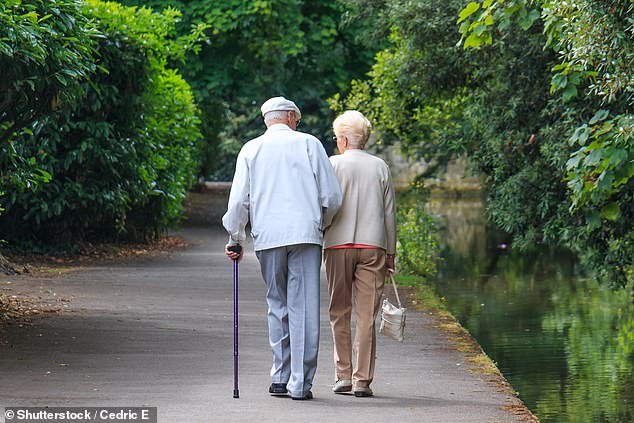Covid pandemic has caused biggest cut to life expectancy since the Second World War – with average lifespan for males falling by 16 months… and by almost a YEAR for females, new figures suggest
- Boys’ average life expectancy fell substantially to 78.7 years compared with 2019
- The figure for girls was 82.7, some 11 months less than those born a year earlier
- It’s the largest drop since 1939-40, with experts blaming surge in virus deaths
The pandemic has caused the largest fall in life expectancy in England since the Second World War, figures suggest.
Average life expectancy for boys born last year was 78.7 years, a fall of 16 months compared with 2019.
The figure for girls was 82.7, some 11 months less than those born a year earlier, Public Health England said.
It’s the largest drop in life expectancy since 1939-40, with experts blaming the surge in deaths caused by the virus.
The data also shows the gap between rich and poor areas has widened to 10.2 years for men and 8.5 years for women.
Life expectancy for males in the least deprived areas fell one year from 83.6 to 82.6 – but almost two years in the most deprived areas from 74.3 to 72.4.
Life expectancy for females in the least deprived areas also fell by one year from 86.8 to 85.8 but 1.6 years in the most deprived areas from 78.9 to 77.3.
The pandemic has caused the largest fall in life expectancy in England since the Second World War, figures suggest
Dr Veena Raleigh, of the King’s Fund think tank, said: ‘This is primarily a result of the Covid-19 pandemic which caused almost 72,000 excess deaths compared with the 2015-19 average.
‘Such a drop is unprecedented in modern times, representing the biggest fall in life expectancy since the Second World War. It is all the more worrying as improvements in life expectancy had already slowed significantly in the decade before the pandemic, with deep and widening health inequalities between the richest and poorest areas.’
She added: ‘This data exposes the widening inequalities in England, with life expectancy falling by nearly two years in the poorest areas compared with one year in the richest. In 2020, the life expectancy difference between the richest and the poorest grew to more than ten years for males and 8.5 years for females.
‘These staggering gaps highlight the urgent need not only to control the virus but also to address the underlying causes of the deep socio-economic and health inequalities that have prevailed for far too long. The pandemic has continued into 2021, already causing 32,000 excess deaths in England to 5 March.’
Dr Raleigh added: ‘While the NHS is delivering an admirable vaccination campaign, the pandemic isn’t over and will claim more lives in the future.
‘The risk of life expectancy continuing to fall below pre-pandemic levels is therefore very real.’
Public Health England said the figures reflect current mortality rates and are not the number of years a baby born last year could ‘actually expect to live’ because mortality rates will change in the future.
The Government said 95 people died yesterday within 28 days of testing positive for coronavirus, bringing the total number of deaths to 125,926.
And there were a further 6,303 lab-confirmed infections in the UK, bringing the total to 4,280,882.


Separate figures from statistics agencies show there have been 148,000 deaths involving Covid in the UK when including additional cases where the virus is mentioned on death certificates.
The virus caused more deaths last year than any other infectious disease since 1918, the year of the Spanish flu pandemic. It comes as a further £7billion was announced yesterday to support the NHS response to Covid-19. It brings the total funding promised for health services to £92billion.
Health Secretary Matt Hancock said: ‘We’ve backed the NHS at every point in this pandemic, so they can treat patients, stay safe and save lives. We’re backing them again today with a further £6.6billion of funding for the first half of this financial year.’
And he announced £341million to ‘support adult social care with the costs of infection prevention control and testing that will make sure visits are safe for everyone’.
He added: ‘We will also be extending enhanced discharge arrangements for mental health patients.’
